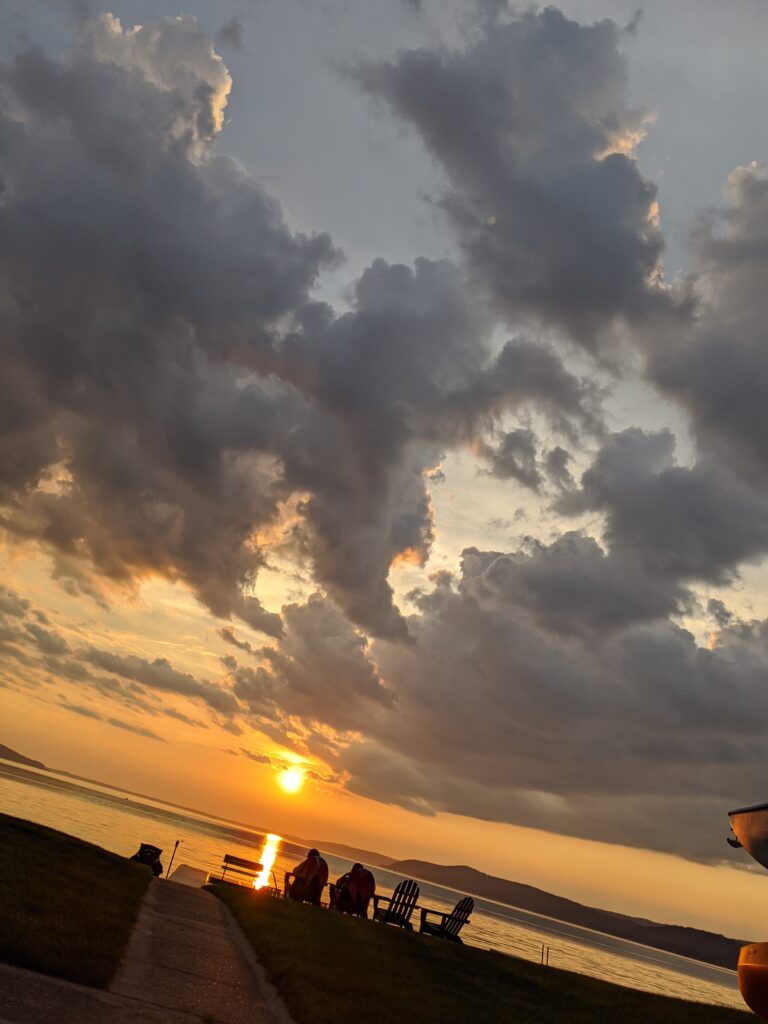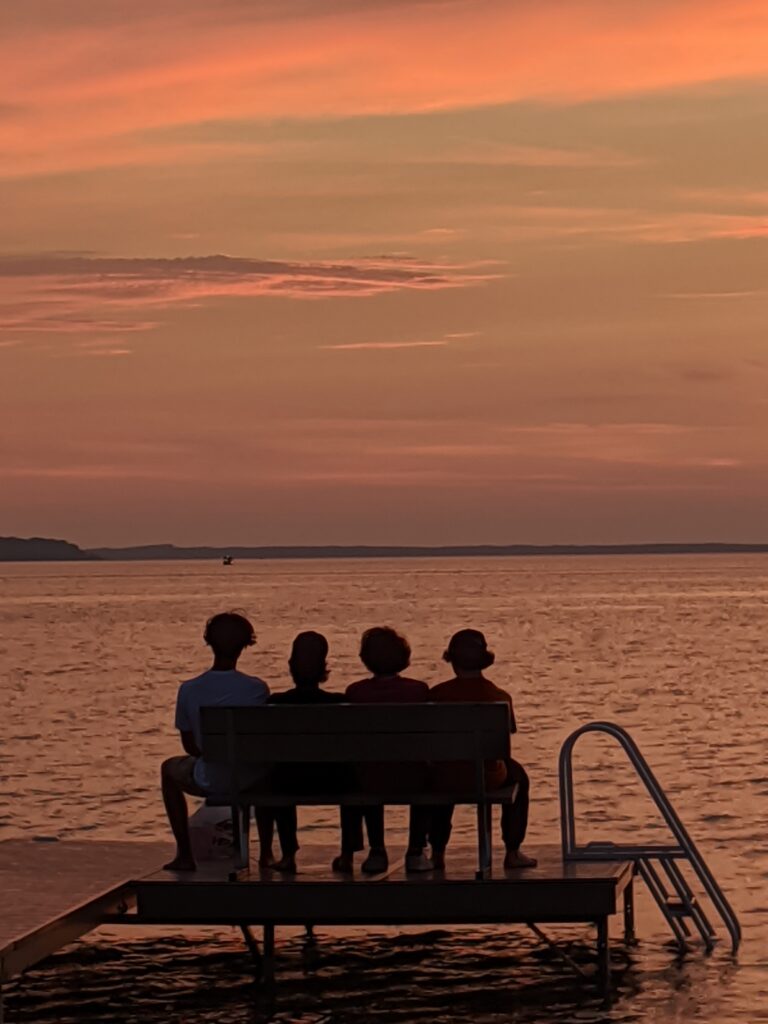Up North

I love the phrase “Up North,” which, in Michigan and Minnesota, indicates not just a direction but an ethos. It is a place to go when you need to relax, to pay more attention to sunsets and lake water temperatures than email. For many, Up North is a ritual or habit — renting the same place Up North for the same week every summer, or owning a cabin Up North and retreating to it whenever possible. Up North is where both parents and children are released from their over-scheduled lives and spend a lot of time dozing in the comfy chairs on the lakeside patio, making giant piles of food for sharing, and concocting absurd ways to float that involve paddle boards lashed to pool noodles and steered by teenagers using primarily their feet. Plus laughing. Do not discount the laughing.
If you go Up North with three families whom you’ve known for more than a decade, you will find yourselves astonishingly free largely to ignore your own children. Granted, the children are now ages 14-20. But given your long history of feeding whichever of those kids happened to be within your vicinity at any given mealtime, pitching in for emergency care, setting up movies, and tucking in subsets of them (not all of whom were biologically yours, although all of them are tucked into your heart) at night, there is a bone-deep memory of caring that is impossible to shake when they are all together. Even though some of their voices have changed, and all of them roll their eyes now, and half of them have drivers’ licenses, it still feels a combination of blissfully freeing and oddly strange to sit down on a rainy afternoon, and feel there is nothing one must do. The girls are upstairs playing cards, and their big brothers have driven themselves (!!) to the putt-putt course, and you are sitting around with your dear friends having already prepped dinner for seventeen, laughing over a cocktail and worrying about nothing except whether there will be enough tortillas for this many people.
It may be true that you have a long history of strategically ignoring these children, on the principle that their boredom is, as one of you so brilliantly put it some nine years ago, “a failure of imagination” which it is their own job to fix. But there is a difference between ignoring their squabbles so that they will learn how to navigate things themselves, and really not having to do anything because they, somehow, have their own money and their own car and can make a plan to go out on their own. THAT is a thing that is hard to get used to. As are their no-longer-softly-babyish bodies, which, every time they come walking out of the lake, startle you anew with their grown-ness. It does not feel very long ago that you were washing improbable amounts of sticky chocolate off small round cheeks, and now those same faces pop around the corner and announce “the brownies are ready” without you even having known the brownies were being baked. (Up North, you will need a double batch of brownies to feed this crowd, especially the perpetually ravenous big brothers. The little sisters automatically know this.)
Up North is, of course, also a place where people live permanently. In Michigan, these are Yoopers (because they live in the U.P.– Upper Peninsula). In Minnesota, they have no specific designation but are generally “out-state” residents (a directionally neutral phrase for anyone who doesn’t live in the Twin Cities). In both states, they are resourceful, plain-speaking, ice-fishing folk whose cuisine might best be described as church-supper and whose skills include knowing how to take advantage of the brevity that is summer at this latitude (well north of Vermont).
One of the great delights of driving through the U.P. — which seems geographically like it ought to be part of Wisconsin but is actually part of Michigan — lies in the subtle ways it is not the place you normally live. Obviously, its topography (sandy soil, evergreens, astonishing vistas across lakes that are so large they disappear beyond the horizon) is fascinatingly unfamiliar, if you are Up North rather than “from here.” But there are smaller things. For example: large plywood buffers on the near side of every mailbox you pass on M-2. Although some of them are painted, or in novelty cutout shapes, these are no kitschy decorations; they are retaining walls to prevent the snowplow from accidentally flattening the mailbox with the piles that increase far taller than the mailbox by mid-winter.
Pasty (pronounced pass-tee) shops and fudge shops and ice cream shops are scattered liberally along the route that circumnavigates Lake Superior. You will not starve (so long as you like meat and dairy), although woe betide anyone who has a blowout and needs to call AAA anywhere between Escanaba and St. Ignace, where a reliable cell connection is nearly impossible.
Along this road lie aged holiday motels of the sort that flourished in the mid-1950s: multiple free-standing pale-pink cabins scattered whimsically around some grassy acreage, with a main-office built to look like a cabin, but with more curlicues on its burgundy shutters, an alpine roof, and a two-tone (pink/burgundy, obviously) “OFFICE” sign above its front door. Nothing on the property advertises “free wifi” because they went out of business before wifi existed, and none of them have a pool because they were simply a base camp, not a destination.
Every year, as I drive past, I wonder why there are so many of these small resorts. Who came all the way up here to stay in these tiny places and do…what? They look remote, aimless, forlorn. And then I realize, as a break in the trees opens up, that Lake Superior is less than a hundred yards from most of these motor inns — just over that sandy hummock and beyond the tree line.
And then I wonder why they are all out of business. Up North has been a summer destination at least since the 1940s, and there are not a lot of fancy resorts that have taken the place of these humble self-catering cabins. They are not in states of terrible disrepair, though the sparse dune-grass that surrounds them looks unkempt, and their paint is peeling. I imagine a certain sort of downstater might love the rustic experience of staying in a place like this, unplugged and simple, with easy access to hiking, those fresh pine smells, and beaches and water cold enough to make your eyes go wide just from wading at least ten months of the year. Someone should buy one, add wifi and a coat of paint — only a fool would change the color scheme, or lament the higgledy-piggledy angles at which each cabin sits, un-parallel to any other — and reopen it. But year after year, no one does.
What links those long-defunct resorts, the fish tacos my friends helped me rescue from ruin tonight, and our children whose bodies have grown and morphed so slowly that it was hard to document, and yet so quickly that I feel I hardly recognize them?
It is a certain element of Up North that I am trying to put my finger on. A space of slowing down that feels at once expansive and impossible to preserve, a location for making memories and for reuniting, a mindset of being rather than accomplishing. Up North is laughter on three floors of a house and breeze off the lake. It is something so long-lasting that my mother tells fond stories of girlhood summer weeks spent Up North, nearly seventy years ago. It is something so transient that by tomorrow, no one will remember how the despair over the failing fish tacos really felt; they will only remember how the final product tasted — sweet and salty and tart and plump and crispy and sauced and perfect. A bite of summer on the tongue.
